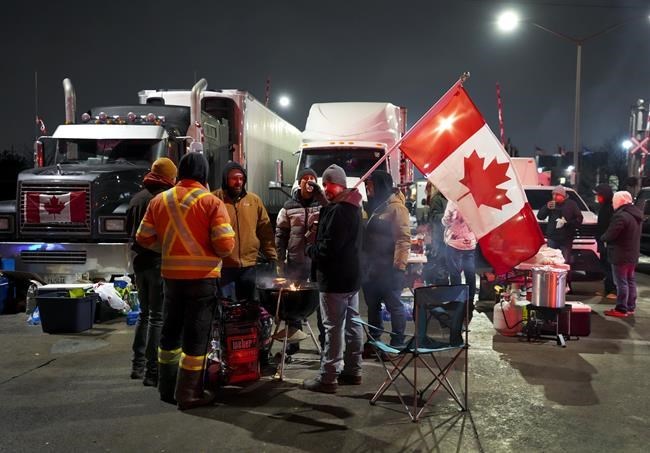Officials looked to the courts Thursday to put an end to what they called an "illegal occupation" at the foot of the Ambassador Bridge, as protesters made themselves comfortable days into a demonstration that's largely shut down one of Canada's busiest border crossings.
Dozens who showed up to protest COVID-19 measures lounged on couches set up on the street, played ball hockey and blasted music from their speakers while the City of Windsor and an automotive industry group sought an injunction they hoped would put an end to the demonstration-turned-tailgate.
"To those who are thinking about joining the protest, let me just say this: you are not welcome here," Windsor Mayor Drew Dilkens said at a news conference.
"I'm hopeful that the facts of this application speak clearly to the court about the need for intervention."
Dilkens said protesters were trespassing on municipal property and could be removed to allow for the safe and efficient movement of goods across the border. He added that he remained hopeful for a peaceful resolution to the protest that began on Monday in solidarity with one in Ottawa.
Superior Court Justice Geoffrey Morawetz said he would hear the injunction application from the Automotive Parts Manufacturers' Association – in which the city was granted intervenor status – on Friday afternoon, rather than proceeding immediately as requested.
"I do not discount the economic impact arising from the plaintiffs' claims," he said. "However, the relief sought is serious in nature and in my view, this proceeding should be adjourned for a short period of time so as to permit the matter to come to the attention of the defendants."
More than 10 big rigs and 70 pickup trucks have been stationed at the Windsor end of the border crossing, blocking both directions of a street that connects with the bridge. Canada-bound traffic from Detroit has been blocked for days, while limited U.S. bound traffic is making its way over the span.
Protesters danced, waved flags – Canadian and American alike – and cheered each other on. Local and provincial police were stationed nearby, blocking protesters from driving more cars into the area but allowing people to join on foot.
And while politicians have been quick to highlight the economic impacts of the border bridge closure, one participant at the Windsor protest said that was exactly the point.
"They'll lose money. Yeah, of course," said Stephanie Parent, a Windsor resident who's stopped by every day of the protest.
"But we have people that have been without work since these mandates have come into effect, since these businesses have imposed these policies, requiring their employees to to get vaccinated ... Until it affects you directly, you don't truly understand the ramifications."
Brad Frederick, 61, is one of those people.
He showed up to the protest Thursday because he lost his job as a maintenance supervisor at a food company last year when he refused to get vaccinated against COVID-19.
While he said he's not too peeved to be off work and collecting unemployment – "it's been great spending lots of time with the grandkids" – he's concerned that vaccine mandates could lead to human rights violations.
"I'm here fighting for my grandchildren's rights. I'm standing up for their freedoms to stop this now and get our freedoms back as Canadians," he said.
Maria Stricescu, who's attending the Windsor protest on weekdays and the Ottawa rally on weekends, had a more specific goal in mind.
"We do not want these mandates anymore. The mandates need to go. Some people in some groups – and I agree with them – we want to see a different government," she said. "We want to see Justin Trudeau out of his position."
Prime Minister Justin Trudeau said Wednesday night that he and Ontario Premier Doug Ford are working to get the situation under control.
"The blockades in Windsor and Ottawa are endangering jobs, impeding trade, threatening the economy, and obstructing our communities. They must stop," Trudeau tweeted after a conversation with Ford on Wednesday evening.
Meanwhile, Michigan Gov. Gretchen Whitmer said the protest is hurting "Michigan's working families who are just trying to do their jobs," noting the Ambassador Bridge is the busiest land border crossing in North America.
"It is imperative that Canadian local, provincial and national governments de-escalate this economic blockade," she said in a written statement.
The protest at the Windsor border mirrors one in Coutts, Alta., that's blocked traffic on and off for more than a week, in solidarity with the so-called "Freedom Convoy" that set itself up in Ottawa.
But unlike the Coutts crossing, which connects to Sweet Grass, Mont., the Ambassador Bridge is the gateway between two automaking powerhouses: Detroit and Windsor.
Automaker Ford of Canada ran its plants in Oakville, Ont., and Windsor at reduced capacity on Thursday, saying the disruption at the bridge could have widespread impact on automakers on both sides of the border.
Stellantis said U.S. and Canadian plants cut short second shifts Wednesday night due to parts shortages caused by the closure of the bridge.
The Canadian Trucking Alliance called on all levels of government to act to end the blockades, which they said were leading to "significant losses."
"Many of those who are protesting having their lives disrupted by certain policies are, in turn, ironically disrupting the lives of their fellow Canadians," Stephen Laskowski, the group's president wrote in a statement.
"Whether it’s the dedicated truck driver who’s stuck at the border and unable to get home to his or her family; or the factory worker who is sent home from work because critical products and raw materials aren’t being delivered, the only people who these blockades hurt are the hard-working Canadians who have kept our nation moving."
This report by The Canadian Press was first published Feb. 10, 2022.
Maan Alhmidi in Windsor, Ont., and Nicole Thompson in Toronto, The Canadian Press



